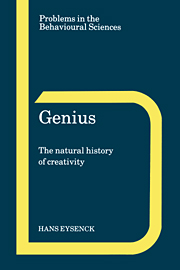Book contents
- Frontmatter
- Contents
- Introduction
- 1 The nature of genius
- 2 Genius and intelligence
- 3 Creativity: measurement and personality correlates
- 4 Conditions for excellence
- 5 Intuition and the unconscious
- 6 The nature of psychopathology: psychoticism
- 7 The roots of creative genius
- 8 From DNA to creativity and genius
- References
- Index
7 - The roots of creative genius
Published online by Cambridge University Press: 04 August 2010
- Frontmatter
- Contents
- Introduction
- 1 The nature of genius
- 2 Genius and intelligence
- 3 Creativity: measurement and personality correlates
- 4 Conditions for excellence
- 5 Intuition and the unconscious
- 6 The nature of psychopathology: psychoticism
- 7 The roots of creative genius
- 8 From DNA to creativity and genius
- References
- Index
Summary
In the discovery of secret things and in the investigation of hidden
causes, stronger reasons are obtained from sure experiments and
demonstrated arguments than from probable conjectures and the
opinions of philosophical speculators of the common sort.
William GilbertCreativity and psychoticism
In this chapter I will review the evidence that P is indeed associated with creativity, both conceived as a trait, and conceived of as achievement. This demonstration is central to the causal theory developed later in the chapter, trying to link creativity with biological mechanisms and the genetic basis of creativity with creative behaviour.
Any theory linking creativity and psychoticism must of course be validated by empirical research, along a number of different lines. One line of research has consisted of using psychosis-prone subjects as high psychoticism probands. As already mentioned, Heston (1966) studied offspring of schizophrenic mothers raised by foster-parents, and found that although about half showed psychosocial disability, the remaining half were notably successful adults, possessing artistic talents and demonstrating imaginative adaptations to life to a degree not found in the control group. Karlsson (1968, 1970) in Iceland found that among relatives of schizophrenics there was a high incidence of individuals of great creative achievement. McNeil (1971) studied the occurrence of mental illness in highly creative adopted children and their biological parents, discovering that the mental illness rates in the adoptees and in their biological parents were positively and significantly related to the creativity level of the adoptees.
- Type
- Chapter
- Information
- GeniusThe Natural History of Creativity, pp. 236 - 278Publisher: Cambridge University PressPrint publication year: 1995



